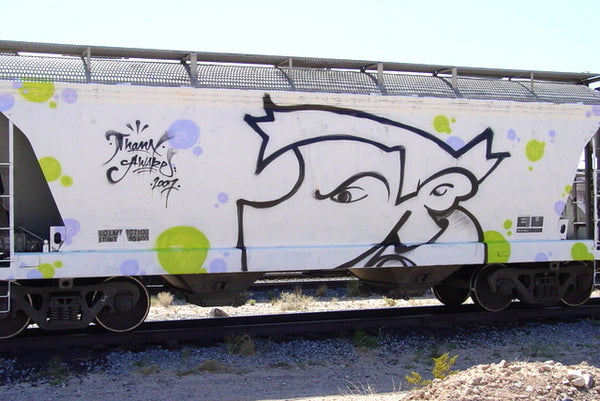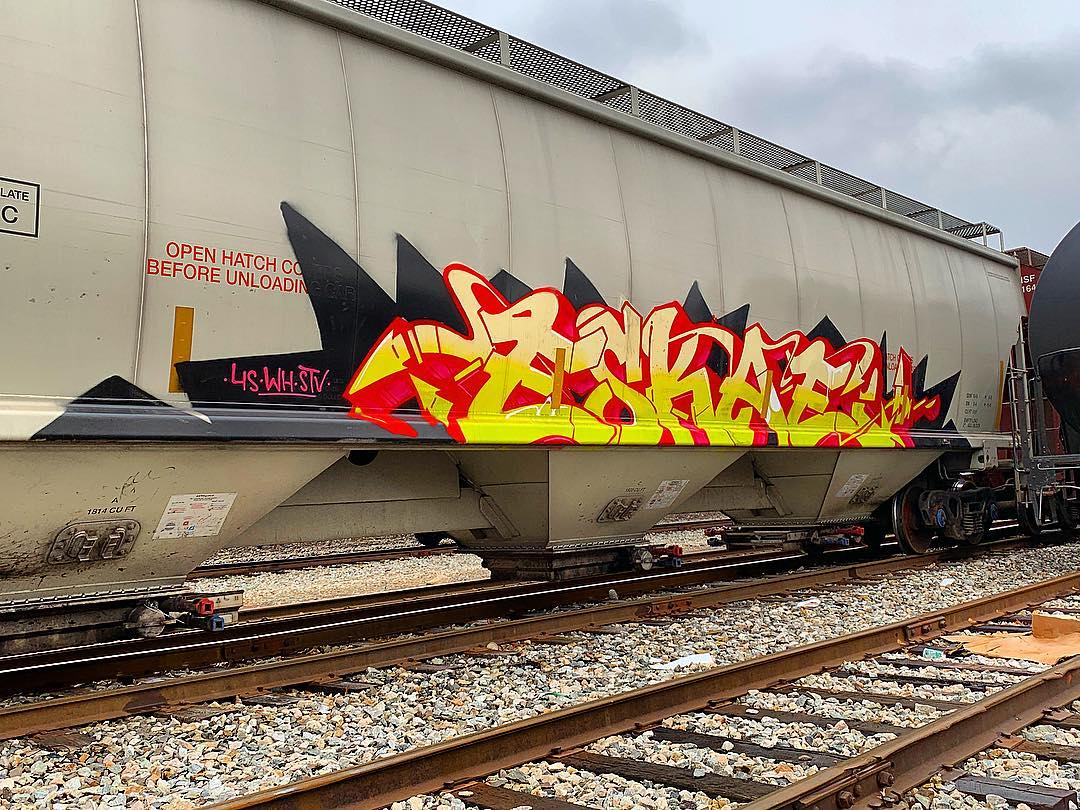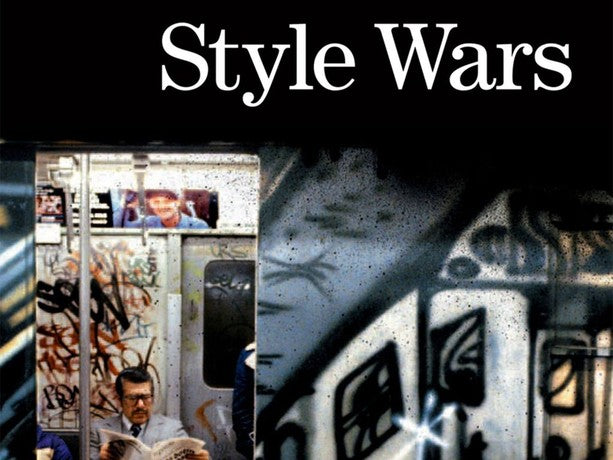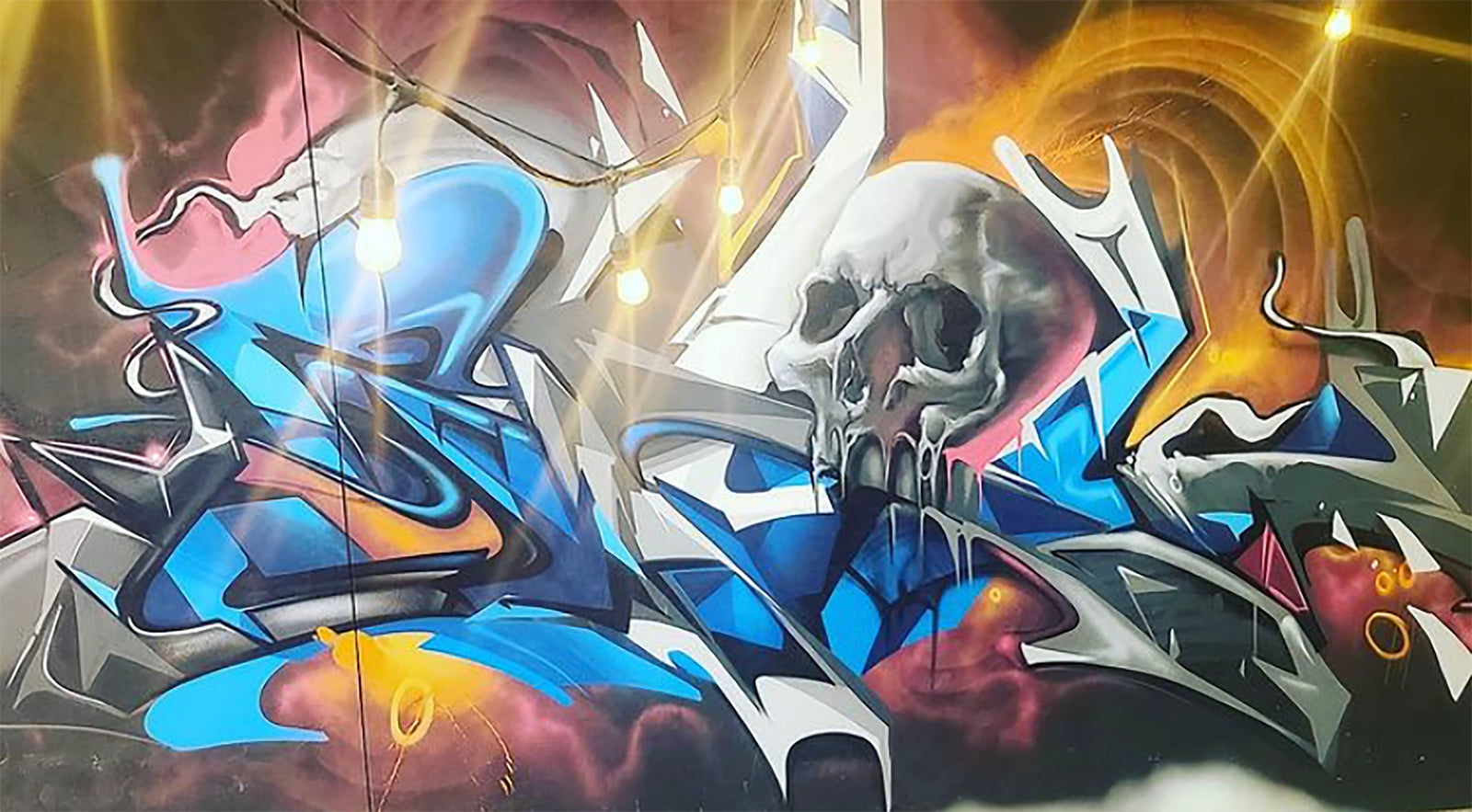Freight graffiti, like the freight trains on which it’s painted, often passes by unnoticed. When a train rumbles past in the dead of night, if anything, you’ll probably just hear its faint horn, think nothing of it and fall back to sleep. If you’re lucky, and a design is bright and bold enough, you might catch a fleeting glimpse.
Still, you’ll almost never be able to tell who made it. The signature will be too twisted to decipher, or too far away, or flying past too quickly. You won’t be able to identify the artist who climbed a fence and crouched in a dark railyard, spraying an intricate tag while looking over one shoulder -- the artist who risked injury and arrest to decorate a train they might never see again.
So why do they do it? Maybe, as Allen Abel of the Utne Reader wrote, “they do this because it is illegal, because walls and alleys are boring, because it unites them with hobo tradition.” Maybe, he writes, “they do it because freight cars move.”
So let’s give freight artists their due. Check out our list of 5 train masters whose work you have to see to believe.

Jaber, aka The White Ninja aka Freight King
“You may have seen my head in your city,” says Jaber, a veteran of the train graffiti game who’s been bombing freights for over 20 years. “I really don’t have to travel to your neck of the woods. I can just [paint] the freights and they’ll do the work for me.”

The head Jaber means is his now-famous two-tone throw-up of a spiky-haired, mouthless, frowning boy who looks ready to throw down at any moment. Jaber describes the logo as “kind of a mutt of many different characters” from 1970’s and 80’s street art, and he estimates he’s put up “a few hundred thousand, maybe more” on walls and trains across the U.S.
But this calling card is just one small piece of Jaber’s iconic freight graffiti oeuvre. Describing himself as a “full blown [graffiti] addict,” Jaber is also an extraordinarily accomplished writer, his letters inspired by such diverse typographic traditions as gothic script, punk rock and -- as seems appropriate for an artist risking life and limb on the railways -- death metal.
Take a look at Instagram’s Jaber photo gallery and his years of dedication are obvious. His train graffiti letters are razor sharp and impossibly tangled, reminiscent of sci-fi liquid metal, alien tentacles, or a comic symbiote. And such experience means that when he’s short on time, he can throw up his famous head in less than 2 minutes.

Ironically, Jaber says it’s almost always easier to sell one of these simple throw-ups on a shirt or canvas than one of his more elaborate graffiti pieces. Following the example of stencil art legend Banksy, Jaber says he asked himself: “If he can make some quid off a stencil, why not make some quid off this ridiculous logo I got?”
More power to him, we say!

Revok From Walls to Freights to Everything Inbetween
You know you’ve made it when giant clothing companies start stealing your work. Just ask outsider artists like Michael Sieben and Sam Larson, whose unique designs (or eerily similar versions of them) unexpectedly ended up on t-shirts in stores like Target and Forever 21.
Or, better yet, ask freight graffiti legend Revok, whose work was so strikingly original that fashion retailer H&M used it without permission in their ads, then, later, tried to argue he had no claim to a copyright.

But that’s just one stop on the wild art ride of Revok, who’s been arrested 3 times in as many years and embodies the passion, rebelliousness, and daring for which freight graffiti artists are famous.
A native of Riverside, California, Revok took to art at an early age, inspired by his father’s collection of albums from the 1960’s and 70’s, and he spent his teenage years obsessing over spray art magazines and comic books, searching for the perfect fat cap, and sneaking out to spray walls and billboards.

Three decades later, Revok’s devotion to the craft has led him to create many of his own graffiti art tools -- including one device that allows him to spray several cans at once -- and to develop an astonishing mash-up graffiti lettering style.
Though in recent years Revok has focused much of his attention on fine art and abstract paintings, headlining gallery openings and selling to major collectors worldwide, he’s never strayed far from his graffiti roots. He still posts murals and freight graffiti to his Instagramand describes himself as “still an overgrown child, writing my name on walls.”
Despite all the success and acclaim, as Revok puts it in a recent freight graffiti post, he simply “can’t let go.”

Troy Lovegates, aka Other aka Freight Master
“Grown ass man in a dark train yard, finger painting.”
That’s how Troy Lovegates, formerly known as Other, describes his early days as a freight artist, when he’d crouch in isolated train yards with old-style oil bars, drawing intricate, strikingly emotive characters on idle boxcars.

Such techniques hadn’t been seen since the “hobos” of the Great Depression, and helped the Canadian artist become something of a legend. “There used to be all these rumors up in northern Ontario, Manitoba and Saskatchewan that I was this hardcore hobo that moved drugs from city to city by boxcar,” he told Juxtapoz.

But Lovegates himself cites a much simpler origin story. Before the internet and smartphones, when street artists used to trade photos of work they’d seen, a friend of his got a package from another artist in San Diego. Inside was a photo of a train Lovegates had painted in Toronto that had found its way to Mexico. “Three time zones away and a 24 hour drive south in a country that at that point I had never set foot in,” Lovegates said. “After that I almost only painted trains.”
His creative outpouring has not stopped since. He’s painted murals in Montreal and expressionist figures in an abandoned 19th-century Spanish convent, filled gallery walls with wood panel paintings and sculptures, and covered trains in his surreal, sombre characters, all of them carried, like the wandering artist himself, on to places unknown.
But it seems Lovegates would have it no other way. As he tells Juxtapoz: “Trains are amazing like that. All that work and history just fades into oblivion.”

Freight Graffiti Master - MECRO
What comes to mind when you think of freight train graffiti? Wild and twisted letters? Illegible bits of psychedelia or seemingly abstract expressionism? No doubt, many of the freight graffiti artists we’ve profiled have been partial to this style.

But Philly train graffiti king MECRO’s writing is markedly different. Clean, crisp lines; sharp edges; what the artist himself calls simply “bold, legible lettering.” Sound boring? Then you’ve never seen a MECRO masterpiece.
An artist of few words, MECRO seems to prefer to let his work speak for itself. And for good reason. He’s been spraying for over 10 years -- 8 of which he’s devoted to train graffiti -- and his commitment shows.

Check out our MECRO train graffiti photo gallery and you’ll see that despite his work’s steady elegance and simplicity, this freight artist is impossible to pin down. Among his train art pieces are some Old West style lettering, bright pink and diamond-sharp, an oozing teal tag reminiscent of toxic sludge, and a glittering comic-style font dipped in liquid gold.

If that’s not enough to convince you of this artist’s seemingly endless creativity, take a look at his Instagram. You’ll be in awe of MECRO’s uniquely tactile graffiti: beveled metal characters riddled with bullet holes; Minecraft-style stone ruins dripping with white-hot lava; portal-like letters holding a sunset silhouette.

Still, MECRO speaks of his work with astonishing modesty: “I usually rotate between a handful of outlines and a handful of techniques,” he says, “revisiting older ideas and improving on them.”
That simple, huh? Not much to do but shake your head. MECRO really is the Rail Legend.

ESKAE - Freight Graffiti
“For me, it’s all about letters,” says ESKAE, a Miami native who’s been spraying freights for over 2 decades. “Simple, readable, and with style.”
“Style” is an understatement. Drawing on the work of 1980’s East Coast graffiti writers and originally inspired by street art classics like the 1983 graffiti documentary Style Wars, ESKAE covers his freights in an explosion of neon colors, thick, rubbery letters, and hip-hop arrows that look like they’re bursting from a cartoon boombox.

Such vivid, twisting designs, looking almost radioactive in the low light of the railyard, are part of what ESKAE calls “my way of screaming at the world.”
But as the artist told us, it’s really his freight graffiti crew that serves as his major inspiration, and their “talent, passion, and work ethic” encourage him during hard times (he’s had his share of police attention) and keep him tearing it up at events like Art Basel alongside greats like Vhils, Ron English, and Shepard Fairey.

Through it all, freight graffiti is the rock on which ESKAE has built his street art career. As he put it in a recent Instagram post, bombing freights just “never gets old.”
It’s reallly hard to pick just 5 freight graffiti artists to feature! Have a suggestion for more featured freight graffiti? Hit us up in the comments!







Dugg Crates
May 11, 2020
•MAPLE•